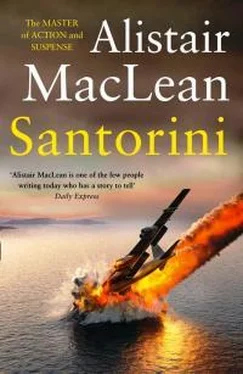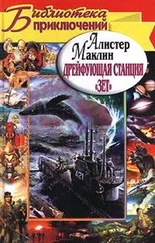‘I think she’s a little scared of you, sir. So is Irene. She wanted to talk about Andropulos. Girl talk, of course, and I suppose there’s no one else really on the ship they can talk to. That’s not quite fair, I suppose, they’re clearly very close friends. Seems that Irene repeated to her, more or less verbatim, the conversation she had with Number One this morning and told her she’d told Vincent everything she knew about her Uncle Adam. It would appear that Eugenia knows something about Uncle Adam that his niece doesn’t know. May I have a drink, sir? I’ve been awash since dawn in tonic and lemon.’
‘Help yourself. Revelations, is that it?’
‘I don’t know how you’d classify it, sir, but I know you’ll find it very interesting. Eugenia’s father has quite a lot in common with Irene’s father – apparently they’re good friends – they’re both wealthy businessmen, they both know Andropulos and both think he’s a crook. Well, nothing new in that so far. We all think he’s a crook. But Eugenia’s father, unlike Irene’s, is willing to talk freely and at length about Andropulos and Eugenia hasn’t talked about it to Irene, because she doesn’t wish to hurt her feelings.’ Denholm sampled his drink and sighed in satisfaction. ‘It would seem that Adamantios Spyros Andropulos has a pathological hatred of Americans. Who would suspect such a charming, courteous, urbane and civilized gentleman to have a pathological hatred of anyone?’
‘I would. Well, we all know he’s intelligent so he had to have a reason.’
‘He had. Two. His son and only nephew. Apparently, he doted on them. Eugenia quite believes this, because she says that Andropulos is unquestionably fond of Irene and herself, a feeling, I’m glad to say, that they don’t reciprocate.’
‘What about his son and nephew?’
‘Disappeared in most mysterious circumstances. Never to be seen again. Andropulos is convinced that they were done in by the American CIA.’
‘The CIA has a reputation, justified or not, for eliminating people they regard as undesirables. But they usually have a reason, again whether that is justifiable or not. Does Eugenia’s old man know the reason?’
‘Yes. He says – and he’s convinced of this – that the two young men were heroin peddlers.’
‘Well, well. Ties in all too well with what we have been increasingly suspecting. There are times, Jimmy, when I regard the CIA as being a much maligned lot.’
The atmosphere at the dinner table that night was noticeably, but not markedly, less relaxed than it had been at lunch-time. Conversation flowed rather less freely than it had then, and three men in particular, Hawkins, Talbot and Van Gelder, seemed more given than usual to brief and introspective silences, occasionally gazing at some object or objects that lay beyond a distant horizon. There was nothing that one could put a finger on and the insensitive would quite have failed to recognize that there was anything amiss. Andropulos proved that he was not one of those.
‘I do not wish to pry, gentlemen, and I may be quite wrong, I frequently am, but do I not detect a certain aura of uneasiness, even of tension at the table tonight?’ His smile was as open and ingenuous as his words had been frank and candid. ‘Or is it my imagination? You are surprised, perhaps, Commander Talbot?’
‘No, not really.’ The only thing that surprised Talbot was that Andropulos had taken so long in getting around to it. ‘You are very perceptive, Mr Andropulos. I’m rather disappointed, I must say. I thought – or hoped – that our concern was better concealed than that.’
‘Concern, Captain?’
‘To a slight degree only. No real anxiety yet. No reason in the world why you shouldn’t know as much as we do.’ As Dr Wickram had said, Talbot reflected, mendacity required little practice to become second nature: there was every reason in the world why Andropulos should not know as much as he did. ‘You know, of course, that the bad weather has forced us to suspend operations on the bomber?’
‘I have seen that it is riding several hundred metres astern of us. Operations? What operations, Captain. You are trying to recover those wicked weapons?’
‘Just one of them. An atom bomb.’
‘Why only one?’
‘Dr Wickram? Would you kindly explain?’
‘Certainly. Well, as far as I can. What we have here is a situation of considerable complexity and doubt, because we are dealing largely with the unknown. You will be aware that a nuclear explosion occurs when a critical mass of uranium or plutonium is reached. Now, there’s no way to prevent a slow but continuous degree of radioactive emanations from a hydrogen bomb, and there are fifteen of them aboard that plane. This radioactivity builds up inside the atom bomb, which is of an entirely different construction, until the critical mass of the atom bomb is reached. Then the atom bomb goes poof! Unfortunately, because of something we call sympathetic detonation, the hydrogen bombs also go poof! I will not dwell on what will happen to us.
‘Normally, because of this well-known danger, hydrogen bombs and atom bombs are never stored together, not, at least, for any period of time. Twenty-four hours is regarded as a safe period and a plane, as in this instance, can easily make a long-distance flight with them together, at the end of which, of course, they would immediately be stored separately. What happens after twenty-four hours, we simply don’t know although some of us – I am one – believe that the situation deteriorates very rapidly thereafter.
‘Incidentally, that’s why I have asked the Captain to stop all engines and generators. It is an established fact that acoustical vibrations hasten the onset of the critical period.’
Wickram’s deep, solemn and authoritative voice carried absolute conviction. Had he not known, Talbot thought, that Dr Wickram was talking scientific malarkey he, for one, would have believed every word he said.
‘So you will readily appreciate that it is of the utmost urgency that we remove that atom bomb from the plane as soon as possible and then take it away – by sail, of course, that’s why the Angelina is alongside, the critical mass will decay only very slowly – to some distant spot. Some very distant spot. There we will deposit it gently on the ocean floor.’
‘How will you do that?’ Andropulos said. ‘Deposit it gently, I mean. The ocean could be thousands of feet deep at the spot. Wouldn’t the bomb accelerate all the way down?’
Wickram smiled tolerantly. ‘I have discussed the matter with Captain Montgomery of the Kilcharran. ’ He had not, in fact, discussed the matter with anybody. ‘We attach a flotation bag to the bomb, inflate it until it achieves a very slight negative buoyancy and then it will float down like a feather to the ocean floor.’
‘And then?’
‘And then nothing.’ If Wickram were having visions of a passenger cruise liner passing over an armed atomic mine, he kept his visions to himself. ‘It will decay and corrode slowly over the years, perhaps even over the centuries. May give rise to a few digestive upsets for some passing fish. I don’t know. What I do know is that if we don’t get rid of that damned beast with all dispatch we’re going to suffer more than a few digestive problems. Better that some of us – those concerned with the recovery of the bomb – have a sleepless night than that we all sleep forever.’
Talbot stirred, half sat up in his bunk and blinked at the overhead light that had suddenly come on in his day cabin. Van Gelder was standing in the doorway.
‘Two-thirty. An unChristian hour, Vincent. Something is afoot. Weather moderated and Captain Montgomery hauling in the plane?’
Читать дальше









